Sage, a geomicrobiologist and molecular biologist, takes us on a journey into the world of blockchain technology and cryptocurrency. Through conversations with Rudy, we explore the potential of blockchain technology to benefit communities, the steps necessary to bring ancient tech. Sage, a geomicrobiologist and molecular biologist, takes us on a journey into the world of blockchain technology and cryptocurrency.
We explore the potential of blockchain technology to benefit communities, the steps necessary to bring ancient technologies into the blockchain, and the importance of using your money to empower yourself and others. Sage shares her personal story of transitioning from a comfortable consulting job to a journey of immense dedication and passion, as well as her mission to create economic systems that truly empower people. Sage's mission is not to become financially wealthy. Rather, she is intent on creating economic systems that empower people. She believes that if we all direct our resources towards this goal, the human species will make it through to the other side.
To that end, she is currently working on a project to verify the origins of food and ensure its quality, in addition to creating a legal infrastructure that will best support her end goals. Join us on this exciting exploration of blockchain technology, ancient teachings, and more!
Links:
This following post was generated using AI via dubb.media 🤖
Transcript
[0:00:00] Sage: I realized that I was never going to feel legitimate enough or ready enough to put up a bitcoin grant for a new project, and I just needed to tear out the band aid and do it. I just knew that get coin on 15 was the right time. There was never going to be a better time. I was never going to feel more ready, and that nature couldn't wait on me to feel cozy about it.
[0:00:22] Rudy: I'm Rudy Dogum, and this is wholesome crypto. Here I speak with crypto experts, influencers, and entrepreneurs to find out what personally led them to the path of cryptocurrency. Welcome stage to the Wholesome Crypto Podcast. Thank you so much for joining me tonight.
[0:00:38] Sage: Hey, Rudy.
[0:00:40] Rudy: So good to have you on, and I really appreciate you taking the time. I know you're busy moving and busy with co founding Resign network, and thank you for being a builder. But before we get into all the building phase and what your life is like in crypto, I want to know a bit about sage before ever even hearing about anything crypto or bitcoin.
[0:01:03] Sage: Oh, sage before crypto. Well, that's most of my life. Wouldn't you like to know? Okay, Rudy, what phase of life would you like to know about?
[0:01:12] Rudy: Let's see. I guess give me one year before you heard about bitcoin.
[0:01:17] Sage: Oh, I probably heard about bitcoin in college. Okay, let's just backtrack to college, then. Tell about that era. So I grew up in a really small town in North Carolina and was like, wow, nature is beautiful, but the world must be so big. I should really go see what's out there. So I was just curious and followed my nose and went to school in Southern California, studied geomicrobiology and molecular biology, and did a bunch of fun stuff looking at weird microbes that grow in the salt and sea, which is near Death Valley, California. In my early years, I would say I was largely fascinated by microbes and spent a lot of time in labs, a lot of time storing things, pouring things, weighing things, autoclaving things, sterilizing things with ethanol, spray bottles, counting cells on plates. I spent a lot of my life in a lab age like, 18 to 25.
[0:02:25] Rudy: Was that something you wanted to do as a kid? I want to be in a lab and figuring out no.
[0:02:31] Sage: I've always loved being outside. So for me, there was, like, this pull in this multi directional pole where I was, like, wanting to understand how nature works, to get under the hood and understand the micro level, how are all these things interplaying? And wanting to zoom in and really getting to do that in a laboratory, but then finding myself confined to kind of a prison of a laboratory. Right. I left graduate school because of that.
[0:03:05] Rudy: That's a tough move. It's like you invest so much time into something that you're like, I got to go.
[0:03:09] Sage: It's not easy my ecosystems of study changed a bit over the years. I went from in high school, I was assisting with studying caves in Eastern Tennessee, western North Carolina, and then in California was studying these weird extremophilic mud volcanoes in the salt and sea. And then in graduate school, I was studying species interactions in Pinot Noir up at Oregon State, which was super fun. It was a really good time, but I was like, wow, if I do a really good job pipetting these tiny amounts of liquids, I can get a full time job pipetting tiny amounts of liquid forever for EJ Gallo, and I can live in Modesto, California. Wait, this master's degree is setting me up to be a director of a laboratory for a large conglomerate winery. And how did I end up here? And, oh, my God, this is not at all the life I wanted. I want to be connected to nature, not living in one of the most, like, desolate, sad places, which is California, sadly, I have a whole love affair with California and a lot of grief for the West Coast, watching it lose water and burn slowly. But my move away from science fund me into a whole spiritual awakening process that somehow spit me out into web three. And I'm not sure exactly how that happened.
[0:04:44] Rudy: I guess was there somebody who, like, said, hey, Sage, there's this thing called ethereum or this decentralized world. You have to get into it. Do you have, like, a friend or a peer?
[0:04:54] Sage: There was no one trying to get me into it. I think, if anything, maybe the opposite. I had a friend who I had met during this phase in my life, like, 2019, early 2020. He was a lover and a partner who I met, and he was from the San Francisco Bay Area. And I had gone to school in SoCal, but I never, like, lived lived like a techie part of the Bay Area. I had lived in Napa doing wine stuff in Sonoma. But I moved out to the San Francisco Bay Area and got to know a bunch of really interesting folks who are, like, interested in consciousness and authentic relating. Also blockchain technology, some of them, although the people who I met who are interested in blockchain technology didn't really lead with it. And there's one person in particular who ended up becoming a good friend of mine. The winter of was the first winter of COVID and I was working a pretty straightforward, like, SAS tech sales job. I was living in Portland, Oregon. I had a roommate who was a friend via this network I had met in the Bay Area, and he and I were, like, hanging out a bunch. I was trying to understand who he was and what he was doing, and I would glance at his double monitors and be like, what's going on over there? And don't worry about it. And come to find out, he's like, with maker dow.
[0:06:26] Sage: He's like, deep with Maker dow and totally wasn't pushing crypto on me. If anything, he had already seen a lot and was skeptical of crypto and was trying to save me from crypto or something.
[0:06:40] Rudy: Don't go through the headache.
[0:06:42] Sage: He wasn't trying to pill me. And I was just deeply curious, and I was like, what are you doing? And then in meditation, I started hearing the word ethereum more frequently, and I was like, well, that's a sign that I should be leaning into this. I should be curious about it. Basically just having one person that I knew from my real life who was a roommate of mine, who I trusted, who was somehow, like, deep in the space, kind of as, like, a proof of concept to me. That crypto was real. Got me curious enough to buy some ethereum to start just really silly things on the Internet, to start reading and falling down some rabbit holes. I did end up in the fall of 2021, which was only last year. Wow, it feels like so long ago.
[0:07:34] Rudy: You mentioned it.
[0:07:37] Sage: Super curious about a particular fork that had really cool branding.
[0:07:44] Rudy: We got the marketing got you.
[0:07:46] Sage: Yeah, the marketing got me, like, literally zero regrets. Good people, crazy times, really. Now that I know what I know now, like, a pretty functional dow because I've been now in other dowels that are less functional than the first dow I was in. And I'm like, okay. They kind of knew how working groups work. They knew how to help people collaborate in a decentralized manner. Like, wow, we really did the fucking thing. And even though the whole idea of an own part of bullshit, which I don't really do big mouse, I'm just here, I'm just like, e building something really cool on ETH. You seem values aligned. This is a good time. I'm entertained. I was just, like, so curious. And I was, like, a community manager and a product manager, and I helped design a DAP, and I got to collaborate with people across three different time zones, creating visuals and blender for adapt. And it was like the wildest, weirdest, fun time.
[0:08:49] Rudy: Was tech always something you're into, though, too, or this is like this whole rabbit hole wormhole of blockchain, and now you're spending so much time in a lab and now you're spending so much time on a computer.
[0:08:59] Sage: I bet I know it's an analogous thing, right? It's like I really enjoy going down rabbit holes and learning a lot about something. I like understanding how systems work. So anything that allows my curiosity, anything where I can just keep digging and pulling back layers keeps me really engaged. But honestly, if anything, I've been really skeptical of technology for most of my life. As a young kid, I remember reading Brave New World, maybe something like 9th or 10th grade. I remember reading Brave New World. We had some sort of ten page or 15 page essay assignment. And it was one of the first long format assignments I had ever gotten. And I just dug into this topic of ethical technology. And I don't know, I guess at a young age I just felt something like I didn't know it at the time, but it was a lie for me. I was like, technology, the ethical use of technology. This is really important. I didn't know how relevant those questions would be now, but of course they're extremely relevant. Ethical implementation, that makes sense.
[0:10:09] Rudy: That's a good big topic of discussion now, right? Like how we use our technology. Times like this where it's such easy times to use technology against other countries, like spying on each other, data privacy, pretty much blocking access to certain viewership and kind of also feeding you with information that makes you think in a certain way. That's a huge debate. You're right. What's the ethical way to use technology? And it seems like blockchain is a good way to actually break into that barrier.
[0:10:35] Sage: I think it's so interesting how all at once blockchain is really complicated and it's really simple.
[0:10:43] Rudy: It makes sense. But the tech behind it is definitely complicated.
[0:10:46] Sage: It's like, okay, we decided we would just create this never ending Russian nesting doll system of data referencing other data and through the chain of reference, everything is legitimized. Okay, cool. That in itself is so simple. And then somehow, humans, in our social complexity, we've created this world now where there's, like, all these chains. Some are interoperable, some really aren't. And now we've got, like, interoperability failures, which I think is like, if, you know, about Molokai? Do I feel like the creation of all these chains is a manifestation of Molok completely because we're diffusing our energy based on these egotistical sort of rabbit holes that all of us are subject to. Right. None of us aren't tempted by these things. At some point in time, right into the ego ask like, how can I leverage myself? How can I put myself forward? How can I propel me into the world? And we have a real opportunity here to use technology for communal benefit. I'm really curious about how we're going to do that because I just see things like, oh my gosh, it's like finance and polka dot and polygon and this and that. And everyone wants to help everyone, kind of.
[0:12:24] Sage: But it's really like expanding their ecosystem based on their VC checks that are getting written. And in the end, it's not people wanting to help people, it's people wanting to spread immunification of an idea of a particular blockchain. And what I'm bullish on are blockchains that don't have an internal incentive other than to support people. Like blockchains that don't have a VC incentive. But literally their only incentive is to support communities, supporting communities.
[0:13:05] Rudy: It's hard to take away the money aspect of it all too, because obviously anyone in the blockchain industry does want to become financially wealthy. No one's going into, like, Aetherium or Bitcoin or Salona thinking. I mean, I'm thinking a lot about the tech is amazing. I want the tech to help out the people. And people have their ownership in favor of privacy, but that doesn't happen unless the value of that token or cryptocurrency goes up. If it's going down, everyone just kind of like, all right, it's no value. Even if you just make an exact replica of Ethereum's code base something else. And if it doesn't have any value into it and monetarily, it's just not going to work because money moves people. It's hard to start, like, a whole new blockchain. Or like, what you're saying that people start a new blockchain, having a VC backing and market it very heavily, saying that we want to help support other people, get a huge community going, and they might be on that mission genuinely and actually, but not maliciously. But I always think back, like, what if we put all that attention and focus into a theorem or into Bitcoin even? What happens if you all just work together instead of having 10,000 different chains that do almost identical stuff?
[0:14:10] Sage: So this is the point in the conversation where I need to ask you, Rudy, do you know about Cosmos?
[0:14:16] Rudy: I do know about Cosmos, but not super familiar. But tell me more and educate me and the fans.
[0:14:22] Sage: Okay, well, do you want to start by telling me what you do know about Cosmos?
[0:14:26] Rudy: Oh, then the cryptocurrency itself. And, like, it's interoperability aspect of trying to combine chains, but not in detail.
[0:14:35] Sage: But interoperability is the heart of it, which is why I bring this up. I'm not here to show anything, and I'm not selling for anyone, so I'll just say that. But I've been learning about cosmos. I don't understand it at a deep level or like a technical level, but what I do know is that it was founded with the intention to empower communities. It was founded with the intention for every network that spun up on the Cosmos SDK to be interoperable with every other network. Right. It's a playground where people can create what they need to create, run their own servers, and get to play with all of their friends. And it's just pretty cool. It's simple in a way, also complex. I've had a lot of, I don't know, questions or concerns around, like, who's maintaining this thing? It's not a centralized source of power. Who's maintaining it? And this is what I learned from Gregory LandWay of Region Network is essentially like, people who are running servers just step in when they need to. It really is this mycelial network of, like, okay, if your servers go down or this or that or whatever, or like, you need help. Other communities who use the Cosmos SDK communicate and help each other so you can be support to your localized community and also to the wider Cosmos community.
[0:16:13] Sage: And you can interoperate your currencies. There's no gas feed, there's no cost for transaction between these currencies. And that ethos really speaks to me. I feel like the way that the Cosmos developers think about community from the ground level just makes a lot of sense. Because in the end, we're moving towards decentralization in a lot of ways, right? Like our electricity sources, our water sources, our food sources, like all of these things. Whatever version of life we're in right now where people live in suburbia and drive gasoline cars, whatever version of reality we're in right now is going to come to an end and we're going to see a new reality. And I'm bullish on the technologies that are inherently supportive of true decentralization. I want to see a world where there are solar farms running nodes in these sort of like, various bioregional zones, and we're farming together, running our nodes together, raising children together, all of it. And I see the Cosmos ecosystem as being a very supportive ecosystem to the real spirit of decentralization.
[0:17:37] Rudy: Well, so I like how you bring it into the whole greater ecosystem of a global idea where everyone is working together for the greater good. That is the ultimate goal for what blockchain and cryptocurrency is doing, is recognizing, understanding. This is becoming a global economy. It's no longer such a base on per state or per country role. Every country is almost thriving off each other to survive. Without Mexico, America wouldn't have so many of its fruits and vegetables. And without China, America wouldn't have their laptops and all of our furniture. Pretty much without America, other countries wouldn't have their services and financial services. It is like a whole ecosystem that we're all in together. I'm glad that the industry that we're in is actually working towards that. Yeah. So as you're developing and growing in this industry, how did you get into the resign network? How did you get into co founding?
[0:18:29] Sage: That's a good question. Yeah. So I'll rewind to February, which 2022 has been the year that feels like it's three years long. So much has happened in one year. So way back in February, this is my first Web Three conference. I feel like a season veteran now, but like, February, east Denver was my first. I didn't know what I was doing. I had a love for Colorado earlier in my twenty s. I had taught skiing out there, and I had friends that lived in Boulder and just went and crashed with my friends in Boulder and went to East Denver. Did a hackathon project with some interesting folks around Dal governance. Sort of understanding which frameworks for Dow governance were correlated with the highest contributor sentiment. So I was doing kind of like the qualitative part of that study and tossing out a lot of survey cards with QR codes, trying to get busy people to answer a survey. Those five questions long, but I had a lot of fun at East Denver. Had the pleasure of meeting Kevin O'Very briefly there, and started to get curious about Bitcoin and just, like, fundraising, alternative forms of fundraising as a whole at that point. Also, at East Denver 2022, an organization picked me up as a consultant to start a Dow for them, and I was pretty excited about it.
[0:20:02] Sage: It was supposed to be a project that would benefit the public and carbon offsetting and power individuals to offset their personal footprints. The long and the short of it is that that particular project did not move forward due to things that are completely out of my hands. Some partnership agreements did not work, and the Dow did not happen. The company still exists, but the Dow, to my knowledge, still does not exist.
[0:20:31] Rudy: Yeah, it's not easy constructing a Dow.
[0:20:33] Sage: So after that experience, I found myself in Europe for Sello Connect in Barcelona in April, meeting some folks. And around that time, April into May, I was just reflecting on everything my background in science, the care I have for the environment, everything that I had learned about carbon credits and the monitoring, reporting, and verification process, also known as MRV. I was just sort of mulling all of that over, and I was like, there's really got to be a better way for us to help land speak for itself. I was really feeling, like, the power of nature moving through me, in particular through a couple of medicine ceremonies. In a way, I felt like nature gave me the green light to move forward with a system that would account for her on economic ledgers. Because I know for a lot of people, there's this idea that commodification of nature is inherently extractive. And that was something that I was still really grappling with, struggling with not knowing what I thought about it, not knowing where I stood. I don't think that putting nature on a balance sheet means that nature will inherently become a part of an extractive economic model. I think our system of consciousness, like, as a human species, our OS, is getting upgraded from extractive economy into regenerative economy. And I do think that our Earth's natural assets need to be accounted for because they've been left off of accounting mechanisms for so long. That truly understanding where our forests are, where our healthy soils are, where our clean waters are. We have a lot of interest in understanding where the health of nature still resides, where regeneration potential resides, and how we can incentivize individuals of means to invest their wealth in ROI that is, feeding themselves and feeding their children food, water that won't give them cancer. We're shifting into a paradigm where that is the ROI. The ROI is not percentage yield, return on dollars. Dollars are collapsing.
[0:23:07] Sage: Spoiler alert. The US. Dollar is failing. Right. The new paradigm that we can invest in is, like, actual clean food and water. And I truly hope that I can communicate that to the right people. And that Resign Network can empower scientists to develop methodologies that will create the protection mechanism for these ecosystems via ecoredit pathways.
[0:23:33] Rudy: That's amazing. You hit the nail right in the head. Like, we are not regenerating our Earth as we're using it. We're not, like, replanting as much as we're extracting. And now in the news, I'm hearing about the forever chemicals in the water, and it's literally every single source of water on Earth has these forever chemicals that just cannot be destroyed or killed. And we're all ingesting it every day. That, to me, is kind of nuts and how much damage we can do and how much we're not, like, giving back. And what you're working on now incentivizing people to actually invest in something that's going to give you an ROI on your own health and well being and your futures health and wellbeing is incredibly needed. How far along are you in the stage of building this network out? And I guess, how can some people hop on and get on board with it? Anyone listening that's interested?
[0:24:23] Sage: So Resign Network, it almost feels like it's still in the womb in a way. Yeah, it's like a little baby that's still in the womb. It's about to be birth.
[0:24:32] Rudy: It's always going to feel like that. That's always your baby.
[0:24:36] Sage: Yeah. So I started thinking about all this stuff around April. It's now October when Bitcoin Round 15 came around and I was working full time like an Ecosystem Partnership account Relations Manager person, I realized that I was never going to feel legitimate enough or ready enough to put up a Git Coin grant for a new project. And I just needed to tear off the Band Aid and do it. I just knew that Gitcoin Round 15 was the right time. There was never going to be a better time. I was never going to feel more ready. And that nature couldn't wait on me to feel cozy about it. I was just never going to feel cozy, but saying, like, I can lead a movement. Give me money. Like, what the fuck? Who is ever ready for that moment? So I did that. And I'm really glad I did. We still got to do all of our paperwork to get everything in order, because right now, as a founder, one of the major things I have to mull over is like, what is the legal infrastructure that's going to best empower me to accomplish my end goals?
[0:25:45] Sage: How do I not get tripwired by legal infrastructure so that I can do what I set out to do? And so I'm talking with a few different folks who are helping me sort that out. I'm hoping to collect more information than Lisbon next week from other founders just to feel into this. And I feel like resign network most likely will be a Swiss.org. And we'll also have like a Delaware LLC Arm, something like that, where we can both have international presence and governance and also have an Arm that can receive charitable donations from corporations in America because that's really instrumental for fundraising. That's a bit about the background, but what we're doing and why. I gave this talk at Sustainability Blockchain Summit a week ago, a week ago in Columbia, giving a talk apparently. And what I talked about was empowering working groups that already exist to do what they are already doing at a faster pace with just higher quality collaboration and working with a couple of core working groups as beta tests. Finding out what they need for scientific collaboration and then building the user interface, building the framework that can actually allow people to work much faster and could allow us to onboard scientists really quickly. Because right now if I say, okay, the knowledge base is on Notion, the communications hub is on Discord, the repos are on GitHub. That makes sense to me because I've had a year and a half to rock this. But it doesn't make sense to a soil science PhD who wants to give us 2 hours of their time on the weekends, who has immense knowledge but like zero familiarity with what we're swimming in. I really feel like compiling the right Legos together in a single user interface for scientific collaboration, for the creation of these methodologies is really going to be the thing that moves the solid. It's going to be like move slow to go fast. We're going to move slow, slow, slow, with a lot of intentionality and with a lot of community feedback at first.
[0:28:02] Sage: And then when we know what Lego pieces need to be in place and how we can put those in place, build it and send people on their way, it's going to be amazing. I'm extremely excited for this.
[0:28:16] Rudy: The whole recipe or the DSAI world, like decentralized science is so fascinating to me and is so ready for disruption. I think we met at DSI Boston and all those talks about, yeah, we need to actually collaborate in science worldwide too. We have so many findings and there's so many barriers for scientists to share their own research and also fear of sharing your research because you don't want anyone stealing it either, or like stealing it and developing something that's commoditized. So it's like a lot of barriers and red tape. And then also fear of losing your own research and not being paid properly, sometimes working really hard along at the lab. It's so skewed and it's definitely controlled by corporations now at a high sense. Of course, everyone's looking for that high dollar value, but it's nice to empower the people who are really putting their time and effort and trying to understand and research what is good, what is helpful, what is beneficial for us as a society, as a civilization, and sharing that, distributing and having that network effect of resi. And I'm glad you're starting this now because you are probably one of the first group of people doing this type of work, and it's exciting for the future. I'm pretty pumped for you for that.
[0:29:35] Sage: Thank you. I'll be the first to say that really and truly, I did not get into crypto for money. I know that's going to sound like bullshit. I know no one will ever believe me, but I left a very comfortable consulting position. Or I didn't leave, but I elected not to renew a contract consulting for a very cozy AG tech company around the time that I fell down that rabbit hole with the om fork. And it wasn't even the idea of the gains through the ome fork that got me. It was the ethos of building community and creating spaces where people could trust their money. And I know in many ways the outcome ended up being the opposite of that. I can acknowledge that without going down that rabbit hole. But really, this feeling of like, we do not trust governmental currencies as they are. You can hold this currency, you can fake it, you can stake and chill, you can be in meditative repose, trusting that your money is safe, et cetera. Like the money that you need to have for your money, for your family, for your well being. Like not excess, but just your squirrel. It's winter. Like your nut storage, you can put it somewhere that's safer than the US dollar.
[0:30:52] Sage: I really like that ethos, to be honest. And Rudy, to this day, I can say, had I stayed in web two AG tech SAS stuff, would I be making more money? Would I not be paying health care out my own pocket? I'm absolutely losing money being in web three. Absolutely losing money. I don't know how else to say it.
[0:31:15] Rudy: It's the truth.
[0:31:16] Sage: It's the truth. I'm losing money in web three. My first attempt at investments were a loss, I think, because I kind of got in on the Euphoria highs of spring 2021 was about the time I found crypto. So I bought high, and that's okay. What I'm trying to say is I'm still here. I'm glad I'm here. I am in this for the creation of economic systems that empower people. But I'm not in it for the end goal of getting rich, because it's not what any of this is about anymore. We would all be fucking lucky to get vegetables for our lifetime. We would be lucky if we could all have housing that really feels safe, food that really is clean, water that really is clean. Like, that is what I want for humanity. And I think we've gotten just so out of whack where parts of the world are living in this crazy level of luxury, and most of the human experience by percentage is like, a lot of suffering. I don't think we need to be in that level of suffering. And I think that we're about to see a lot more suffering, like with climate tragedies, with climate chaos, climate change. But I really do think that we have enough time that if people who are ready to wake up, wake up now and take their millions of dollars and can redirect it into systems that regenerate land, that we can make it through like the human species can make it through to the other side of this.
[0:33:04] Sage: But only if we help enough people wake up now and put their money where their mouth is. Literally. Because you can't eat money. You can't eat money. At the end of the day, you can try, but it's not going to go down easy.
[0:33:20] Rudy: It's pretty nuts to think like, as a civilization, we have the technology and we have the power to live a comfortable life, all of us together.
[0:33:30] Sage: But humans are humans, but it's not our reality. And the question is why? How have we self organized in this way such that there's so much disparity between the comfort of the elite and the discomfort of the poor? I'm not here to chill some ideal of a world in which everyone's experience of life is the same. I don't believe that will ever exist or is like Dharma. Everyone has their unique dharma. Everyone has their unique path. I'm not here to change that for anyone. But I do think that people with deep pockets, I think they don't know how close they are to losing their nice organic food supply. And do they even know what the fuck is in their organic label of food from Whole Foods? Because all of the systems that rich people have helped corrupt are corrupting them and getting organic labels put on bullshit food. And there's very little food to this day that is truly clean and safe. You can be sure of what's in it.
[0:34:37] Rudy: And yeah, I have no idea what's in those organic labels either. I just have to trust it, I guess. But I don't like trusting me. I want to verify that it's good.
[0:34:46] Sage: Which is where blockchain comes into place. I remember learning about file coin ages ago because, yeah, when I first went down the crypto rabbit hole I had been with before, I was consulting for the AG tech company. I was with an IoT company, and I just remember hearing about supply chain traceability with file coin and getting extremely excited about that. And honestly, I still am. There's always going to be some layer of trust that is involved when a human squats down and harvests a bunch of kale, right? That action, I guess, can be captured on the camera, but there can be soil sensors verifying the quality of the soil, the soil health. You can basically take a bunch of kale, you can bag it, you can put a sensor on it or put a sensor on the shipment or something, and then you can verify on chain or off chain that things are what they are. I don't think we'll ever completely circumnavigate the human problem of corruption. I think desperate people do crazy things. I don't even want to call them crazy things. Like, people in desperate situations do desperate things. Right. The better we can empower technology to, like, serve how humans already work and how things move, how things flow, I think we have a pretty good shot at verifying how things originate and where things move through, how food is delivered to your doorstep and where it came from.
[0:36:21] Rudy: Yeah, it's crucial to have that, hopefully eventually, sooner than later. I also want to know you have your hands in crypto now, pretty deep in your traveling to different conferences over the world, working on this project. What does Sage do to keep her own mental health in check and just kind of phase out of crypto if you need to? Some people just love diving. What do you do for fun? Your hobbies and also mental health checks.
[0:36:45] Sage: Deep down, if I didn't feel this immense spiritual calling to do this, I would not be doing this. So the things I do in my free time, I love yoga. I don't do nearly enough of it. I have to calm myself out on that. But back in 2018, 2019, I started formal Yogic path, although I guess it informally started around age 18 or so, maybe earlier. But yeah, I study yoga. I study contract yoga, which is like a very slow, breath based form of yoga where you hold poses for a really long time. And that is a deep technology. So I'm bullish on ancient technologies and rediscovering them. So, like, literally holding your body or resting your body in a given position that allows specific channels of energy to move spinal fluid, to move all the blood flow, all of it, we can have an effect on our consciousness in the way we utilize our bodies, for sure. Like, yoga has proven that to me. And I think, if anything, this podcast being interviewed right now is a good reminder for me to really double down on my daily yoga practice and not let it totally fall to the wayside in all of this. Because if I lose my yoga practice, it will be the end of me. I have to keep it up.
[0:38:11] Rudy: It's wild that you say that, because my wife, she has a yoga wellness business, yoga hub, and I didn't do any yoga before I met her. I wasn't into it, didn't really know anything. I was very much like the engineer mindset. Like, oh, you don't need that. You're just laying down and sleeping. Until I started practicing with her and doing and learning more about the actual ancient teachings of how it's supposed to be helpful and why it's helpful physically and mentally. So I got into meditation. Now I got into doing yoga more routinely. Not as much as I should be of course, but it helps a lot. And it's funny because I was the one to teach her about cryptocurrencies and blockchain. She's like, well, this is great because that's needed in this yoga industry pretty heavily. So now we're discussing ideas on how to incorporate yoga and blockchain.
[0:38:57] Sage: The yoga of blockchain.
[0:38:59] Rudy: Yes, because it's all about the ancient information that we lose that thankfully, that blockchain can keep and record. But yeah. So anyone out there definitely meditate and definitely practice yoga because it is, like you said, being in tune with your body, understanding why it's acting a certain way, learning how to not necessarily just control it, but acknowledge why it's happening and find a path to release or guide into a better method of acting.
[0:39:25] Sage: Yeah, our body contains a lot of knowledge. Like I learned about Permaculture. This fall, I take a permaculture design course and we talk about zones. And it's funny because in some ways, zones are kind of like similar to the word layer that is used in three. But your zone zero is kind of your personal domain. And like, your zone zero is considered, like your personal well being, like your state of being. And only once you're like zone zero and your zero are okay, you can look at your zone one, your house and the things immediately growing outside your house and your zone two, your herb garden, and you can expand your horizons. So I feel that a lot of us tending our zone zero, our way of holding ourselves enough, myself included. I am calling myself out. Like, I truly had something like a mental breakdown in Gr 15. Working full time for Bitcoin, which is doing a grants round, is already an 80 hours week job. And then starting a project, trying to be on Twitter Spaces to launch it and promote it and all of that. I truly overdid it and broke myself in September. That's another piece of information for me. I'm learning how to take care of myself.
[0:40:53] Rudy: It's a practice. It really is. I don't call it a practice for like, you practice at it, you try again and try and practice and get better. It's not easy. I'm thankful that you share that because I think a lot of the crypto world doesn't talk about how difficult it is sometimes. It's a young industry where a lot of times you just have to give your time with no reward until something does happen. It's funny because sometimes people are working during the bear markets and then during, like, a bull market, the coin exploded in price, whatever it was, but it took five years of nothing to get somewhere and actually become worth something. I had Kevin Owaki on the show, too, and he's like, he just failed and failed project after project until Coin came about.
[0:41:34] Sage: I'm glad you had Kevin.
[0:41:36] Rudy: It was good. And that's the thing that you're working on, your project, launching during a bear.
[0:41:41] Sage: Market during the middle of it.
[0:41:43] Rudy: That's a good time, because the bull market does come back. That's like, oh, this is legit. You're not just something that came out of nowhere. You're someone that's been around for a while, and you're an entrepreneur. It's not supposed to be easy unless you had someone who just invested millions and millions of dollars into you, which I hope you get.
[0:41:57] Sage: No. We got some conversations going with some truly values aligned organizations in the Web Three space, and I don't feel like I'm out here alone. I don't feel like I'm going to need to scurry off to some venture capital that I don't trust in order to be okay. I deeply trust that everything is working out, and I also trust that knowing me and knowing this project, I would put it in hibernation mode and go get another job before I would take the wrong check from the wrong person just to keep it alive or whatever. You know what I mean?
[0:42:33] Rudy: I love that. Yeah. That brings me to my final question. What is your most memorable wholesome crypto moment? Something in the crypto industry that just made you feel good and proud to be in it, or something you witnessed in the crypto industry, it made you really happy?
[0:42:47] Sage: Okay. The most wholesome moment that's coming to mind. Yeah, this feels true. So back, like, the third week of September, gr 15 was just wrapping up, and I was starting to come back to life after pulling crazy hours for, like, two or three weeks or something on end. And I was in Western Massachusetts, which is where I moved now, and I was working on my process of moving here. And the region network team happened to be having their company annual off site retreat. They're like week long retreat, this beautiful, ideally, summer camp location in Western Massachusetts, and they invited me to come and hang out. Even though at that time I was formally employed by Gitcoin, I was a member of the Git coin team. I was not a member of the region network team. They invited me to come and be present with them and to share with them how they could donate to Bitcoin grants rounds. And there was a little interactive workshop thing workspace we did the following morning where they learned how to use Bitcoin grants for many of their community members. They hadn't donated yet and needed some guidance. I don't know, just that moment of feeling welcomed into that community just did something to me that was so powerful, it shook me to my core. And they invited me to eat dinner with them in the JFK airport on the way to Medicine for Cosmos, and I had to excuse myself to go sob in the bathroom because I couldn't believe how welcomed I felt. For the first time in all of my adventures in Web Three, I truly felt welcomed and acknowledged and, like, treated well.
[0:44:43] Sage: Treated like a human and just have to give a lot of love to Region Network, to Gregory LandWay, Will Dal, Sarah Bassendell, all the people that have been truly welcoming to me.
[0:44:56] Rudy: I love that. That's so beautiful because it's like you see it and you experience it and you're like, oh, it's possible for this to exist and you just want to give it to other people now, too. Just hearing your story makes me want to be more like that, too. So thank you for sharing.
[0:45:11] Sage: Thank you for listening.
[0:45:13] Rudy: Thank you, Sage. I had such a great time talking with you. I'm super excited for the Resign network. I'm super excited for you as a person, and I'm going to keep watching what you're building and yeah. Thank you.
[0:45:25] Sage: Thank you. Yeah. Please feel free to follow me at resign network and my personal is at renegade region. It's been a real pleasure connecting with you as well, Rudy. Thank you for hanging in there with me with some of these more nuanced topics of economic regeneration, economic collapse, food systems, all that stuff. The things I hold dear to my heart are not for the faint of heart. Thank you.
[0:45:51] Rudy: Thank you.

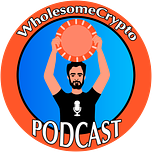



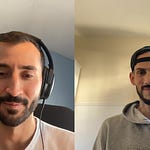

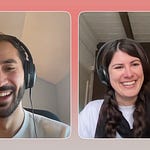

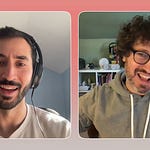
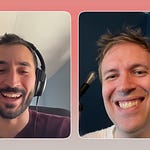
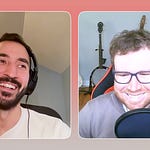
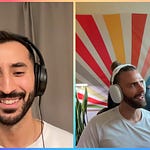
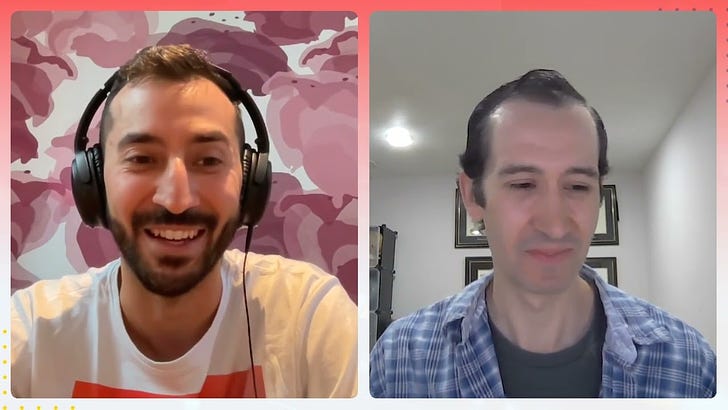
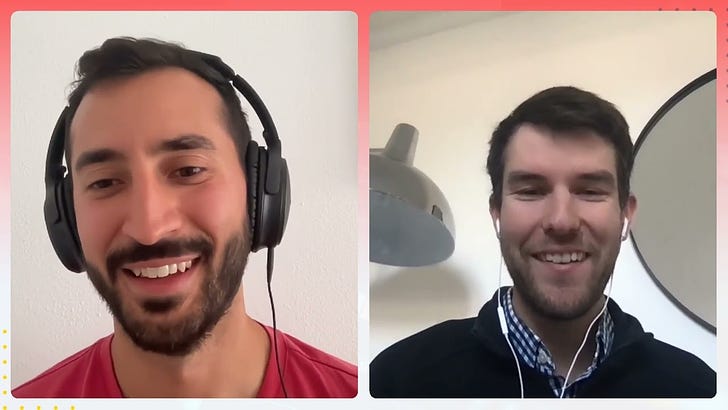
Sage - ReSci Network